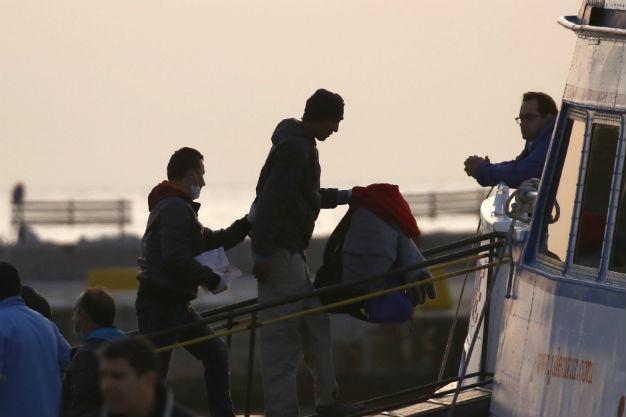Migrant swap starts between Turkey, EU
İZMİR/HANNOVER

A Frontex officer (L) escorts a migrant as he boards on a Turkish-flagged passenger boat to be returned to Turkey, on the Greek island of Lesbos, April 4, 2016. REUTERS photo
A first Syrians arrived in Germany from Istanbul April 4, while a first group of migrants arrived in Turkey from Greece on the same day under an EU-Turkey migrant deal aimed at stopping the influx of refugees into Europe.
As the sun rose over the Greek islands of Lesbos and Chios, 202 migrants, mainly from Pakistan and Bangladesh, were ferried back across the Aegean Sea, retracing the perilous journey they took on rickety boats in their desperation to reach Europe.
Yorgos Kyritsis, the Greek government’s migration spokesman, said 136 migrants had left from Lesbos and 66 from Chios.
“These are migrants who did not request asylum in Greece. The majority were Pakistani. There were two Syrians who did not request asylum for personal reasons,” Kyritsis was quoted as saying by the Associated Press.
A few dozen police and immigration officials waited outside a small white tent on the quayside in the coastal Trukish Dikili town as the migrants began to disembark behind security fencing following the short crossing.
About a dozen people stood at the port holding a banner that read “Welcome refugees. Turkey is your home.”
Meanwhile, the 32 Syrian asylum seekers flew into the northern German city of Hannover on two separate flights and were to be taken to a shelter about 140 kilometers away.
The representative from the Federal Office for Migration and Refugees, Corinna Wicher, asked reporters to respect the privacy of the asylum seekers, who were members of six families. An AFP reporter saw 10 children and an adolescent in a wheelchair among the two groups.
“This is all very new, very difficult,” Wicher said. “They have been travelling for a very long time.”
One protester also arrived to meet the group, holding a banner reading: “Please keep fleeing, refugees not welcome.”
Wicher said the new arrivals would spend two weeks at the temporary shelter in the town of Friedland for orientation, including lessons in basic German and logistical practicalities, before being placed in housing around the state of Lower Saxony.
The first group of Syrian refugees that were sent to Germany from Turkey were picked by the German authorities and the UNHCR, after Turkey’s Directorate General of Migration Management sent them a list they had prepared, diplomatic sources told the Hürriyet Daily News on April 4.
As for the migrants sent from Greece to Turkey, the sources said the processing of the migrants that had reached Greece by March 20 had been conducted by Turkish and Greek officials.
“The ones currently coming to Turkey are the ones that do not qualify for immigration status,” said the source, adding that there were nonetheless Syrians among the people sent back, in addition to Iraqis and Afghans.
Turkish Prime Minister Ahmet Davutoğlu spoke to German Chancellor Angela Merkel late April 3, Turkish prime ministerial sources said. The two leaders talked about the details of the deal.
Merkel’s spokesman, Steffen Seibert, said the leaders had discussed the start of returns and “agreed that the pact must be implemented successfully.”
Davutoğlu also talked to NATO Secretary-General Jens Stoltenberg on April 3, hours before the deal swap went into effect.
The telephone conversation late on April 3 took place upon Stoltenberg’s initiative, anonymous sources told the state-run Anadolu Agency.
Turkish EU Affairs Minister Volkan Bozkır said April 4 that the migrants coming from Greece would be sent to the southern Turkish province of Osmaniye.
In an interview with private broadcaster Habertürk TV, Bozkır also said Syrians taken from camps in Turkey would be sent to Germany, from where they will be sent on to other countries.
Under the EU-Turkey deal, Ankara will take back all migrants and refugees who enter Greece illegally, including Syrians, in return for the EU taking the same amount of Syrian refugees directly from Turkey. The EU will give a total of $6 billion to Turkey to increase the living standards of the Syrian migrants in the country, grant early visa-free travel and progress in its EU membership negotiations.
Turkish Interior Minister Efkan Ala said April 3 that his country was ready to receive 500 people on April 4 and that Greek authorities had provided 400 names, although these numbers could change.
